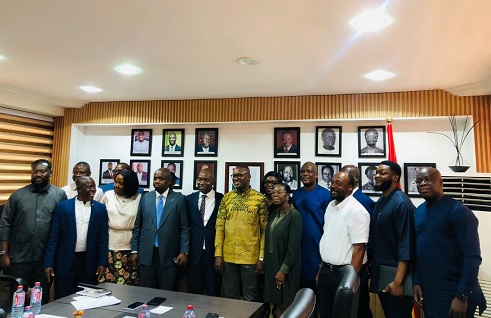The Ministry of Energy and Green Transition is to review the downstream petroleum sector to align it with modern standards.
“This time around, we are taking a holistic view of the entire petroleum sector so that we can define rules well, bring about operational efficiency, increase accountability and ensure that we serve the people,” the Minister of Energy and Green Transition, John Abdulai Jinapor, has said.
In a stakeholder engagement with key members of the petroleum downstream industry in his office in Accra yesterday, he said a seven-member committee had already been set up for the power sector to engage stakeholders and provide policy recommendations.
Mr Jinapor assured stakeholders that the review would be done safely and sustainably, and their suggestions incorporated.
He explained that while his predecessors had tried to review some parts of the sector, those efforts stalled in Parliament.
The minister said the government was using a comprehensive approach to improve regulations, increase efficiency and enhance accountability to better serve the country.
At the meeting were representatives from the Chamber of Bulk Oil Distributors (CBOD), led by its Board Chairperson, Ivy Apea Owusu; the Chamber of Oil Marketing Companies (COMAC), led by its Board Chairman, Gabby Kumi; transport owners, and representatives of the Tanker Drivers’ Union.
Also present were the Chief Director of the Ministry of Energy, Wilhelmina Asamoah; the Director, Legal, Sarah Fafa Kpodo; the Director of Petroleum, Upstream and Downstream, Benjamin Kwame Asante, and the acting Chief Executive of the National Petroleum Authority (NPA), Godwin Kudzo Tameklo, among others.
Gold for Oil
Mr Jinapor added that there would be a review of the Gold for Oil programme, in line with the National Democratic Congress (NDC’s) manifesto promise.
“The Finance Ministry is already working on the gold aspect, with plans to establish a Gold Board to oversee its implementation,” he said.
The minister said his outfit would also conduct its assessment to ensure the programme met national interests.
“We have begun some work, but it’s only an interim arrangement. We need a well-structured solution, and we cannot rush the process,” he said.
Mr Jinapor said the government was committed to resolving the foreign exchange challenges affecting the petroleum sector.
In line with that, he said the ministry had met with the Minister of Finance (MoF) to discuss a transparent approach to managing forex issues.
Commitment
To strengthen local participation in the petroleum industry, the minister further reaffirmed the government’s commitment to prioritising Ghanaian entrepreneurs in refinery operations.
“Our vision is to have Ghanaian businesses take the lead. We will take a fresh look at the Tema Oil Refinery, but in line with our local content policy to ensure that local players get the first opportunity,” he added.
He encouraged local companies to explore partnerships to build capacity where necessary.
The Chief Executive Officer of CBOD, Dr Patrick Ofori, said contributions of Bulk Distribution Companies (BDCs) to the energy sector should not be overlooked.
Dr Ofori lauded the government’s decision to integrate the Compressed Biogas Market (CBM) and local content policies, saying it would strengthen the industry’s foundation.
He also commended the government’s green transition agenda and affirmed CBOD’s commitment to supporting sustainable energy initiatives.
Dr Ofori, however, urged the minister to address frequent policy changes, such as zonalisation, which had affected investment recoveries.
For his part, the Chief Executive Officer of (COMAC), Dr Riverson Oppong, expressed their commitment to industry growth through collaborations with regulators such as the National Petroleum Authority (NPA) to introduce price deregulation, combat fuel smuggling and improve tax compliance.
Dr Oppong also said the downstream industry contributed over GH¢19 billion in taxes and created more than 60,000 jobs in 2024.
He appealed for policy stability, improved engagement with regulators, and measures to protect existing investments.

